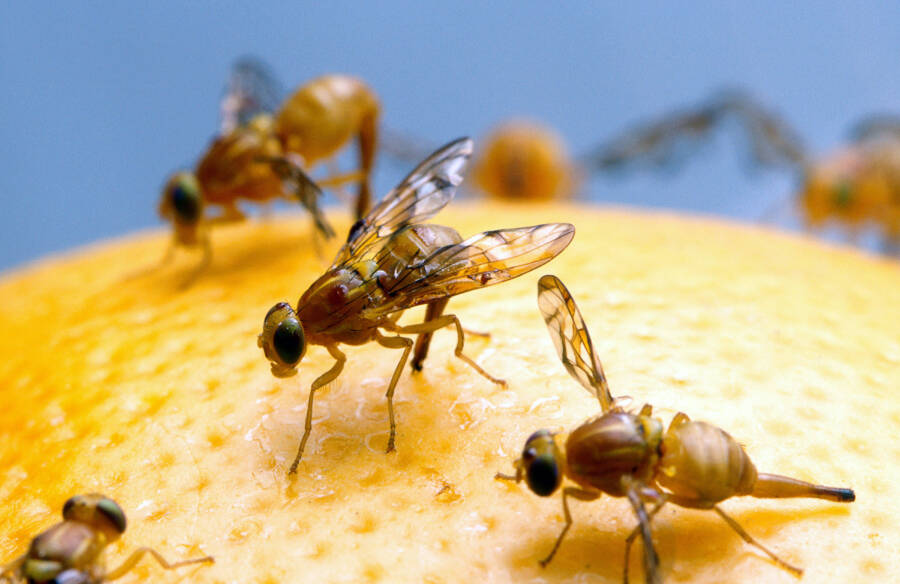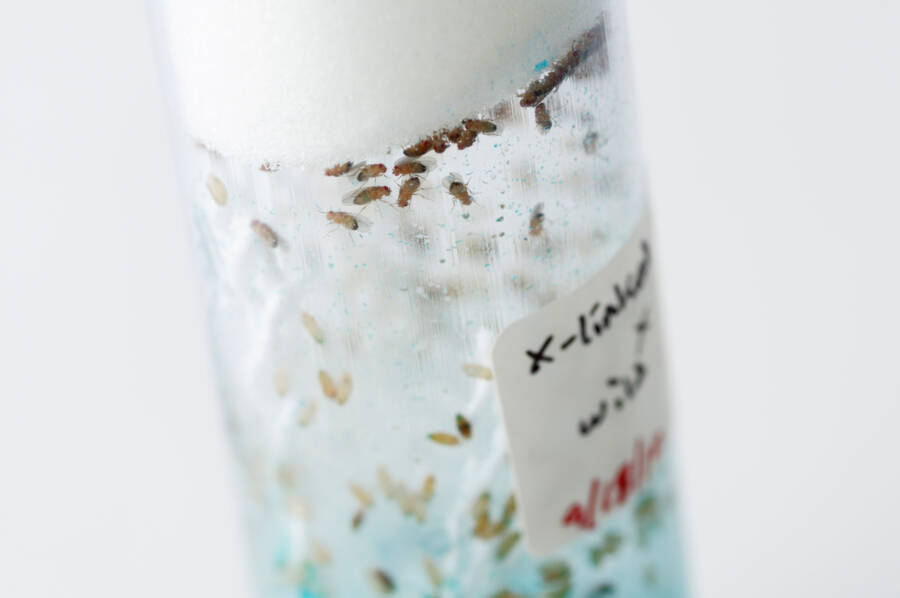The results of the study may help examine the link between perception of stimuli and physical wellbeing in other animals.

Scott Camazine/Alamy Stock PhotoFruit flies enjoying a tasty treat.
In a morbid new study, researchers at the University of Michigan in Ann Arbor found that fruit flies exposed to the corpses of other fruit flies tend to age faster, die quicker, and even become “marked” so that other fruit flies avoid them. Researchers hope the study will reveal how an animal’s perception can influence its physical health.
The study began by accident. The researchers initially wanted to see if fruit flies would develop heightened immunity after being around sick fruit flies, but their experiment changed when they noticed interesting data from the flies who witnessed the death of sick fruit flies.
“The only types of responses we saw happened after the flies that we infected died,” Scott Pletcher, a biologist at the University of Michigan, told the New York Times.
So, the experiment took on a new meaning:
“Our lab has long been interested in how the brain controls aging,” Pletcher said. So the team decided to change their experiment to document how visual perception influenced physical health in fruit flies.
At the beginning of the study, researchers first starved a group of fruit flies and collected their bodies.
“There’s a very special place in fly hell for me,” neurobiologist and lead author of the study Christi Gendron joked to the New York Times.
Next, the research team exposed living fruit flies to the dead ones and recorded their brain functions.
According to the study published in the journal PLOS Biology, the team recorded specific neurons that activated in a fruit fly’s brain upon seeing the deceased flies.
Their data revealed activity in the ellipsoid body, a part of the brain that processes visual information. When researchers used fluorescent dye to isolate the specific neurons involved in processing the grim scene of dead fruit flies, they began experimenting with activating them on and off.
When the neurons fired during exposure to death, the exposed flies lost their stored fat and died sooner than other fruit flies. Most interestingly, flies that had not seen death avoided the exposed flies, almost as if death had “marked” the latter somehow.
Researchers also activated these neurons in fruit flies without exposing them to the sight of dead fruit flies, and they, too, had shorter lifespans.
When the researchers deactivated the neurons, the sight of dead fruit flies did not affect the flies’ lifespan.
“[This] shows that [fruit flies use] a specific set of serotonin-receptor-possessing neurons,” Marc Tatar, a biologist at Brown University who was not involved with the study, told the New York Times.

Martin Shields/Alamy Stock PhotoA vial of experimental fruit flies.
Although the research team has this data, they cannot conclusively explain why neuron activity leads to shorter lifespans.
According to Tatar, it is possible that seeing dead fruit flies may encourage other flies to reproduce quicker, thereby shortening their lifespan through exertion. However, the Michigan scientists note that exposure did not result in greater reproduction rates in their study.
Other explanations include stress. Today, we know that stress levels can impact one’s lifespan and quality of life. This is true for other animals, including elephants, monkeys, and birds.
It may be true for fruit flies as well. After all, “If we suddenly found ourselves in a sea of dead humans, that would be very stressful,” Pletcher said to the New York Times.
The next step in the testing process is to experiment with the impact of social interactions on fruit flies’ lifespans. And while the researchers still have work to do, their new study brings us closer to understanding the impact of perception on physical health and longevity, even in humans.
“While translating these findings to humans is clearly speculative, we hope that more research can eventually help researchers better understand the physiological and psychological effects of people who routinely witness death, such as soldiers and first responders,” Gendron wrote for The Conversation.
After learning about the interesting research into fruit flies’ exposure to death, uncover 10 most surprising effects stress can have on the body. Then, discover the story of the Milgram Experiment, a study that revealed how easy it is for human beings to commit heinous acts.





